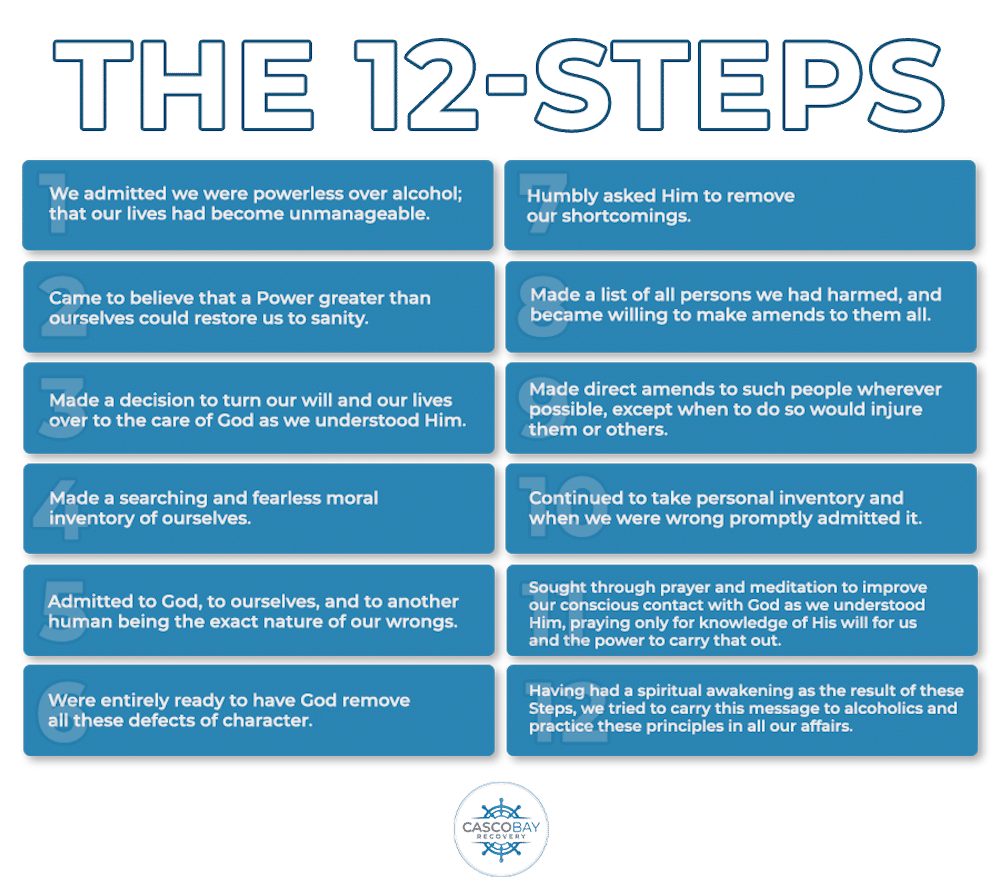 One of the most popular types of addiction therapy comes in the form of 12-step programs such as Alcoholics Anonymous (AA). Nearly three-fourths of all addiction treatment facilities offer admittance into 12-step programs.
One of the most popular types of addiction therapy comes in the form of 12-step programs such as Alcoholics Anonymous (AA). Nearly three-fourths of all addiction treatment facilities offer admittance into 12-step programs.
This approach to treatment can help those in recovery maintain their sobriety long-term. 12-step meetings are widely available and offer support and guidance for those working to overcome drug and alcohol addiction. At Casco Bay Recovery, we offer 12-step therapy as just one part of our comprehensive treatment programs.
If you’re looking for a 12-step therapy program in Portland, Maine, contact Casco Bay Recovery. Reach out to our team online or call us at 844.940.4407 to ask about our 12-step programs and other addiction therapies.
What Is a 12-Step Program For Addiction?

A core component of 12-step therapy is that those in recovery can help each other reach and maintain abstinence from the substances or behaviors to which they are addicted.
Clients going through a 12-step therapy program will go to group counseling sessions together, share their experiences, and support each other. The 12-step model also gives them a model to follow when they’re building emotional tools and mental practices to maintain sobriety and control their chronic disease of addiction.
The 12 steps that are at the core of this form of care were created by the founders of AA. They’re supposed to establish guidelines on how to overcome an addiction to alcohol. However, the program gained enough success for other addiction support groups to adapt the steps.
However, like many addiction treatment therapies, 12-step therapy will usually work better as part of a larger program that’s customized for each client.
The actual effectiveness of 12-step therapy is not easy to measure because of the anonymity needed for it to work. Less data means less formal research on the topic. However, the popularity of the 12 steps suggests long-term effectiveness.
Who Needs 12-Step Therapy?
If a client has no difficulty admitting their powerlessness over their addiction, believing in a higher power that can help them, and deciding to turn control over that higher power, then 12-step therapy would be perfect for them. The language of the 12 steps emphasizes the presence of a higher power as each client understands it, allowing for different religious beliefs and interpretations.
Some clients won’t find it easy to heal within a 12-step therapy program. The original 12 steps are based on spiritual principles which nonreligious clients may not resonate with. Some may want or need treatment that promotes the empowerment of the self to exercise control over recovery from addiction. Some may simply not work well in group situations.
While 12-step therapy can be very effective, it shouldn’t be part of a client’s treatment if they won’t respond well to the concept.
What Are Other Addiction Treatments That Work With 12-Step Therapy?
Alongside 12-step therapy, a client can have most other forms of care available. It can be difficult to set up concurrent treatments if a client’s 12-step therapy program is also an outpatient one, but sticking to an entire schedule of multiple forms of care is easy for a client in a residential treatment program.
Psychotherapy, if not part of 12-step therapy, should nevertheless be part of most addiction treatment plans. While 12-step therapy usually focuses on peer group sessions, many addiction treatment programs will also require family therapy. Other approaches, such as acupuncture or yoga, may also improve a client’s relaxation and calmness, which will help them maintain sobriety.
Learn About Casco Bay Recovery’s 12-Step Therapy For Addiction in Portland, Maine
Searching for a 12-step therapy program in Portland, Maine? Contact Casco Bay Recovery’s team online or call us at 844.940.4407.

